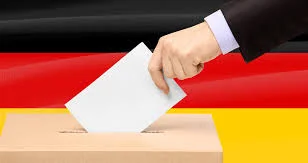Again? The Two Major Parties in Germany Weigh Options By Richard Moeller
When the Free Democrats (FDP) received over five percent of the national vote in last September’s German Federal Election, Merkel’s Christian Democrats (CDU) were, for all intents and purposes, delighted to know that an old coalition partner was back on the scene. Parties become eligible for government after getting over five percent nationally in any given election. The CDU/FDP were, for thirty years, coalition partners.
Bear in mind, in 2013 the FDP had “tragically” failed to secure the right to be a part of federal government altogether. Just a month ago, FDP praise from Merkel’s more conservative sister party in Bavaria (Christian Social Union - CSU) for the hurdle leap, suggested Merkel’s hope of a partner could lay with the FDP. However, the talks broke down in the last few days over pressure from the FDP to readdress the migrant issue, lower taxes and “concede less” to the Green Party.
After all, the Greens were to become the other of these three potential government-makers. When the FDP walked, the chance for a government seemed mathematically impossible. Another election should be called? Think again, Realpolitik kicked in and the two major parties began to weigh their option and scheme.
Photo by Sean Gallup/Getty
“Scheme” might seem over-the-top; yet, for many Germans, the reversal of the Social Democrats’ (SPD) new, but often stated, principled standing as “the opposition” and thereby not interested in government, feels phony now. What’s more, there is a direct connection between this coalition and the erosion of support for each over the past few years that the SPD experienced first-hand last September.
Indeed, for the left-leaning members of the SPD who believed that the party was to isolate and reform itself so that it could counter the Left Party (Die Linke) as to pull those members in with similar policies feels duplicitous. For the ideological (partisan) German, reuniting the two major parties looks more like power preservation and less like reform that is, in their minds, necessary.
Photo by Wolfgang Rattay/Reuters
The “elephant in the room” is the Alternative for Germany (AfD). This Rightist party is indefinitely ostracized for its policy positions and no party will agree to use the percentage that they can offer for a coalition. Additionally, talks about another vote to recalculate and see what Germans have to say about the CDU (primarily) again is more or less unthinkable with the AfD having a chance to acquire more legitimacy and tarnish the current leadership of the Chancellor even more than two months ago.
For the casual observer, not much can be good here for the current top leadership as it desperately turns to its bitter rival. The long-term negatives seem to outweigh the short-term stability and restoration of the status quo.
Yet, the SPD has now stepped up to save the German people from another election, counter the fear of a multiple party minority coalition, and keep the AfD from getting a foothold in the western part of the country like it has in the East. Is this wise? It seems like the two major parties are arguing that they know best since the parties to the Right of the Bavarian CSU and Left of the SPD cannot be trusted to act responsibly. For Centrists, the term “radical” or “far” to describe the more ideological parties rolls right of the tongue.
Photo by Julien Warnand
Indeed, for Merkel (CDU) and Martin Schulz (SPD) a continuation of the “great” or “grand” coalition is a bulwark against extremism. Many scholars have noticed the similarities of the big two as the political edges on the Left and Right secure close to double digit support. A continuation of the current make-up should be easy for the CDU and SPD, but it never is.
Another, in a long line of, powerful party governments along with subsequent leadership positions which would demand moderation in the legislative arena and dominate the executive with the top federal appointments, will likely anger Germans (especially young Germans). Polls have shown a desire to move beyond Merkel and Realpolitik. Ethics and not expediency is, for many, the desire. But, Germans also fear the Right and some like the aforementioned FDP fear the Left.
A continuation, without an election or influence from the edges, would placate some with “the devil you know.” The unknown ghoul died with the FDP and the Greens unable to agree. A German grand coalition continuation may occur, but before it does, the parties must realize that the “devil’s in the details.”
Richard R. Moeller is an Associate Professor of Political Science at The Metropolitan State University of Denver









